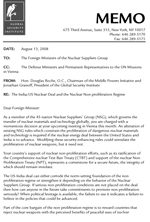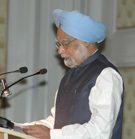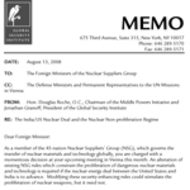Below is the text of an open letter to the Foreign Ministers of the Nuclear Suppliers Group regarding the role of the NSG in the pending nuclear cooperation agreement between the United States and India.
 |
|
We urge all of our concerned friends and colleagues to utilize their energy and creativity to ensure that the proposed US-India nuclear sharing deal does not injure the nuclear non-proliferation regime and express themselves to their representatives and decision-makers.
This letter, signed by the Middle Powers Initiative Chairman Douglas Roche, O.C. and Global Security Institute President Jonathan Granoff, was also sent to the Defense Ministers of these countries, as well as their top ambassadors in Vienna, where the NSG is set to meet to discuss the deal later this month.
» Read the letter (also in a printable PDF format)
The letter urges these Foreign Ministers to use the opportunity of the US/India deal to take a principled position to strengthen the entirety of our global security regime, such as that advanced by US Congresswoman Ellen Tauscher, Congressman Sam Farr and Congressman Ed Markey. In their own letter to the NSG Foreign Ministers, these Congressional leaders urged that entry-into-force of the Comprehensive nuclear Test-Ban Treaty (CTBT) and negotiation of a Fissile Material Cut-Off Treaty should be placed as conditions of the deal. Others suggest that at a minimum, India should be compelled to sign the CTBT. Such a compromise is consistent with the spirit of the US Hyde Act.
» Read the Congressional letter
Supporters of the deal, at least on the US side, argue that the agreement marks the first step towards bringing India into the global non-proliferation regime. However, Prime Minister Singh made it abundantly clear to India’s parliament that they will remain as free as possible from international intrusive constraints on its nuclear activities, particularly relating to its nuclear weapons arsenal:
 |
|
“The essence of the matter is that the agreements that we negotiate with USA, Russia, France and other nuclear countries will enable us to enter into international trade for civilian use without any interference with our strategic nuclear programme. The strategic programme will continue to be developed at an autonomous pace determined solely by our own security perceptions. We have not and we will not accept any outside interference or monitoring or supervision of our strategic programme… I confirm that there is nothing in these agreements which prevents us from further nuclear tests if warranted by our national security concerns… The cooperation that the international community is now willing to extend to us for trade in nuclear materials, technologies and equipment for civilian use will be available to us without signing the NPT or the CTBT.”
(Source: https://www.pmindia.nic.in)
If the NSG allows perceived economic benefits to shred the fabric of our collective security mechanisms, what non-proliferation regime will be left for India to join? To allow the deal to go forward without obtaining some non-proliferation benefit would be a hazardous affront to the principles of the global regime. GSI believes that if the deal should be done at all, it must actually support rather than undermine the non-proliferation regime.
Furthermore, this is consistent with India’s nuclear disarmament aspirations. Earlier this year, at a high-level conference in New Delhi, Prime Minister Singh advocated the universal, legally verifiable elimination of nuclear weapons. Senator Roche and Mr. Granoff both presented at this historic conference to commemorate the Rajiv Gandhi Plan to Eliminate Nuclear Weapons. In their presentations, these civil society leaders called upon India to assume its rightful place in a leadership role in negotiating a non-discriminatory global prohibition on nuclear weapons.
» Watch a video of Prime Minister Singh’s speech
Senator Roche argued, “India today is at a crossroads and holds the global future of nuclear weapons in its hands… India must become active in new efforts for global nuclear disarmament. The world will welcome India actively working with like-minded states for the advancement of human civilization by the abolition of nuclear weapons.”
» Read the full transcript of Hon. Douglas Roche’s remarks
» Watch a video of Senator Roche’s presentation
In his advocacy for a Nuclear Weapons Convention to ban all nuclear weapons, Mr. Granoff said, “India is uniquely positioned to advance this route. It has the political arguments, the national interest, the cultural and moral calling, and historical moment. The world needs the compass point of leadership. Where can this be found? … The ancient culture and wisdom of India identifies it as that leader today.”
» Read the full transcript of Mr. Granoff’s remarks, Beyond Deterrence
» Watch a video of Mr. Granoff’s presentation
More links:
– The Campaign for Responsible Nuclear Trade
– GSI eAlert: What’s Next for US/India? Press Briefing in Washington, DC
– MPI Chairman Calls on World Leaders to Stop US/India Trade Deal
Click here for a printable pdf version of this letter
DATE: August 13, 2008
TO: The Foreign Ministers of the Nuclear Suppliers Group
CC: The Defense Ministers and Permanent Representatives to the UN Missions in Vienna
FROM: Hon. Douglas Roche, O.C., Chairman of the Middle Powers Initiative and Jonathan Granoff, President of the Global Security Institute
RE: The India/US Nuclear Deal and the Nuclear Non-proliferation Regime
Dear Foreign Minister:
As a member of the 45-nation Nuclear Suppliers’ Group (NSG), which governs the transfer of nuclear materials and technology globally, you are charged with a momentous decision at your upcoming meeting in Vienna this month. An alteration of existing NSG rules which constrain the proliferation of dangerous nuclear materials and technology is required if the nuclear energy deal between the United States and India is to advance. Modifying these security-enhancing rules could stimulate the proliferation of nuclear weapons, but it need not.
Your country’s support of nuclear non-proliferation efforts, such as its ratification of the Comprehensive nuclear Test-Ban Treaty (CTBT) and support of the nuclear Non-Proliferation Treaty (NPT), represents a cornerstone for a secure future, the integrity of which should remain inviolate.
The US-India deal can either corrode the norm-setting foundation of the non-proliferation regime or strengthen it depending on the behavior of the Nuclear Suppliers Group. If serious non-proliferation conditions are not placed on the deal then how can anyone in the future take commitments to promote non-proliferation seriously? When political leverage is available, the failure to use it indicates a failure to believe in the policies that could be advanced.
Part of the core bargain of the non-proliferation regime is to reward countries that reject nuclear weapons with the perceived benefits of peaceful uses of nuclear technology and materials and hinder such opportunities to those who proliferate. The US-India deal cuts at this core bargain . As other proliferators that are not party to the NPT, such as Israel and Pakistan, are already preparing the groundwork for similar bilateral deals, parties to the Treaty have to wonder what value the Treaty really holds for them. What message is being sent to non-nuclear weapon states party to the Treaty? Is it that if an economic opportunity is valuable enough, it will even trump the integrity of the non-proliferation regime specifically designed to keep the world safe from the spread of nuclear weapons?
The NSG is asked to approve a bilateral agreement that might contain some US generated legislative checks pursuant to the Hyde Act. However, the political agenda in India makes it very clear that their domestic goal is to become as free as possible from international intrusive constraints on its nuclear activities, particularly relating to expanding its nuclear weapons arsenal. Even if the NSG approves the deal with Hyde Act requirements and India later violates them and the deal collapses then what will be the principled position to constrain the next deal from a country that does not have Hyde Act principles and is solely governed by economic concerns?
Some NSG member states, cognizant of India’s strategic importance, are wary of opposing the deal out of fear of economic reprisals. How likely are these so-called reprisals? They are certainly less likely than the dropping of reprisals arising from the proliferation activities of India and Pakistan that nuclear weapons states so rapidly exhibited when trade opportunities arose. India will similarly be guided in the future by trade concerns should any NSG member exercise its rights to constrain the deal for international security concerns.
The approval of the deal will undermine specific non-proliferation policies in exchange for a speculative economic benefit. At what price does the remainder of the non-proliferation regime get sold?
If you agree that the costs of this deal as presently proposed are unacceptably high, we urge that your approval be contingent on obtaining several important non-proliferation benefits. Or, we urge that you simply reject the proposal as is and demand that the parties return later with a proposal that sufficiently meets non-proliferation concerns. They can certainly craft a deal that does better than frontally attack a core bargain of the NPT.
A legitimate position might be that which was expressed by Congresswoman Ellen Tauscher, Congressman Sam Farr and Congressman Ed Markey, who, in a letter to you dated October 4, 2007, who urged that entry-into-force of the CTBT and negotiation of a Fissile Material Cut-off Treaty become necessary conditions of the deal.
Your country is a steadfast supporter of the CTBT and is strongly committed to achieving its entry-into-force. Unlike 43 countries of the NSG, neither India nor the US has ratified the CTBT. Thus, the US-India deal is an unprecedented opportunity to advance the CTBT’s entry-into-force. The sincerity of your country’s commitment to the CTBT’s entry-into-force will inevitably be thrown into doubt should you bypass this historic opportunity to advance it.
Respectfully submitted, 

Hon. Douglas Roche, O.C. Jonathan Granoff
Chairman, Middle Powers Initiative President, Global Security Institute
![]()






